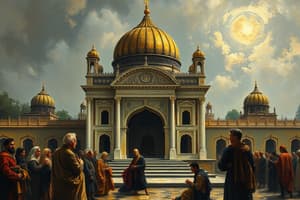Podcast
Questions and Answers
How did the Ottoman Empire change the city of Constantinople?
How did the Ottoman Empire change the city of Constantinople?
The Empire changed the city's name to Istanbul, made it the capital, and turned an important church into a mosque.
The government in the Ottoman Empire is best described as?
The government in the Ottoman Empire is best described as?
complex and effective.
The ruler who was best known for defending religious freedom and promoting tolerance was?
The ruler who was best known for defending religious freedom and promoting tolerance was?
Akbar.
The Taj Mahal is an example of?
The Taj Mahal is an example of?
In general, the Mughal Empire supported?
In general, the Mughal Empire supported?
Which ruler promoted religious diversity in the Ottoman Empire?
Which ruler promoted religious diversity in the Ottoman Empire?
How did the Ottoman Empire respond to non-Muslims?
How did the Ottoman Empire respond to non-Muslims?
Mughal emperor Akbar showed respect for religious diversity by?
Mughal emperor Akbar showed respect for religious diversity by?
Who was a powerful sultan in the Ottoman Empire?
Who was a powerful sultan in the Ottoman Empire?
Which ruler founded the Mughal Empire?
Which ruler founded the Mughal Empire?
Which religions were practiced in the Mughal Empire?
Which religions were practiced in the Mughal Empire?
Ottoman sultan Suleiman I and Mughal emperor Akbar both?
Ottoman sultan Suleiman I and Mughal emperor Akbar both?
Akbar most helped non-Muslims by?
Akbar most helped non-Muslims by?
A difference between Babur and Akbar was that?
A difference between Babur and Akbar was that?
Which best explains how Babur's rule of the Mughal Empire influenced Akbar's rule?
Which best explains how Babur's rule of the Mughal Empire influenced Akbar's rule?
Mehmet II and Suleiman I were similar in that they?
Mehmet II and Suleiman I were similar in that they?
Which was an achievement of Suleiman I?
Which was an achievement of Suleiman I?
Flashcards are hidden until you start studying
Study Notes
Ottoman Empire Overview
- Constantinople was renamed Istanbul and established as the capital of the Ottoman Empire.
- The significant transformation included converting an important church into a mosque.
- The Ottoman government was characterized as complex and effective in administration.
Key Leaders
- Mehmet II promoted religious diversity and tolerance within the Empire.
- Suleiman I expanded the Empire into Eastern Europe and is renowned for his leadership achievements.
- Akbar, the Mughal Emperor, was recognized for his efforts in defending religious freedom and promoting tolerance among different faiths.
Religious Policies
- The Ottoman Empire granted freedom of religion to non-Muslims, ensuring a degree of religious coexistence.
- Akbar eased the enforcement of Islamic law, demonstrating respect for religious diversity.
- Both Suleiman I and Akbar were noted for their policies that granted religious freedom to non-Muslims.
Contributions to Architecture
- The Taj Mahal is a prominent example of Mughal architecture, showcasing cultural and artistic achievements of the era.
Imperial Foundations
- Babur is recognized as the founder of the Mughal Empire; his respect for diverse beliefs laid the groundwork for Akbar’s policies.
- Akbar is regarded as the greatest leader of the Mughal Empire, especially for promoting religious tolerance.
Religions in the Mughal Empire
- The Mughal Empire was home to multiple religions, predominantly Islam and Sikhism, reflecting its cultural diversity.
Distinctions Between Leaders
- A noted difference exists between Babur and Akbar: Babur created the empire, while Akbar is celebrated for his governance and promotion of tolerance.
- Babur's approach to religious beliefs significantly influenced Akbar’s emphasis on tolerance, shaping the Empire's policies.
Summary of Achievements
- Suleiman I and Mehmet II shared the goal of territorial expansion, enhancing the Empire's power and influence.
- Akbar positively adjusted taxes for non-Muslims, furthering his legacy of tolerance and integration.
Studying That Suits You
Use AI to generate personalized quizzes and flashcards to suit your learning preferences.




